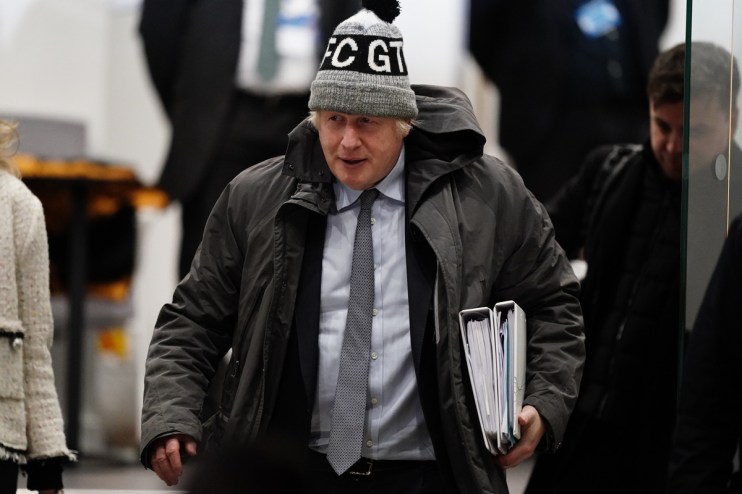Covid-19 Inquiry: Five things we learned during Boris Johnson’s evidence

Boris Johnson was sworn into the official UK Covid-19 inquiry to give evidence on his handling of the pandemic this morning.
While the appearance was widely mooted as a blockbuster session, Johnson appeared to mostly adopt a defensive position – and apologised to the families bereaved by the disease.
The former Prime Minister’s hours on the ‘stand’ will continue tomorrow and Chancellor Rishi Sunak takes up the mantle next week.
And although there were none of the shock revelations that followed chief adviser Dominic Cummings turn, here’s what we learned:
Looked at Sage minutes ‘once or twice’
Johnson, who has previously been criticised for failing to grasp details, told the inquiry he may only have read minutes from a key group of science advisors “once or twice”.
Asked by lawyer Hugo Keith KC if he read the Scientific Advisory Group for Emergencies (Sage) minutes, Johnson revealed: “I think I did once or twice look at the – maybe more than that – looked at what Sage actually said… Sage certainly produced a lot of documentation.”
The former prime minister said he tended to rely on Sir Patrick Vallance and Professor Chris Whitty “distilling [Sage’s] views and conveying them to me”.
And pressed on the matter, he admitted that “in retrospect it may have been valuable to hear the Sage conversation unpasteurised itself”.
Admitted meetings were ‘male-dominated’
Appearances from Cummings and top civil servants including deputy cabinet secretary Helen MacNamara have been dominated by reports of unpleasant behaviour in government.
Speaking today, Johnson defended his administration in the face of questions about a toxic atmosphere – and insisted ministers and officials “got an awful lot done”.
He argued it was better for the UK and “creatively useful” for leaders to criticise each other, as it led to better work, rather than risk being “deferential” and “reluctant to make waves”.
However, he also said he regretted more women were not in top jobs; that too many meetings were “male-dominated”; and that gender balance “should have been better”.
The ex-Prime Minister said he had personally phoned and apologised to MacNamara, who was revealed to have been slated by Cummings in expletive-ridden WhatsApp messages.
Did not remember Hancock warnings
Johnson told the inquiry he did not recall all the conversations in which former health secretary Matt Hancock claims he tried to raise concerns about the pandemic with him.
Hancock claimed he tried to warn Johnson about Covid-19 four times in January 2020.
The former Prime Minister said he remembered speaking to Hancock on January 7, but added: “I don’t, to be frank, remember all those conversations but it’s true that we would have spoken on many occasions because we generally spoke quite a lot.”
He said he could not remember a call on March 13 in which the then health secretary called for an immediate lockdown, as Hancock claimed in his evidence last week.
“I’m afraid I don’t [remember], but it’s been a long time,” Johnson said. “I think my state of mind then [was that] I’m now more or less in virus fighting mode… we’ve got to sort this out.”
Government should have ‘twigged’ sooner
Johnson admitted he should have “twigged much sooner” when the pandemic took hold in Italy in February 2020.
Scenes of overflowing hospitals were appearing on the news at this time, and the former Prime Minister recalled that “the scenes from Italy really rattled me”.
He told the inquiry he saw a note that Italy’s fatality rate was eight per cent due to its elderly population and reflected that Britain also had an ageing demographic.
But Johnson stressed while he thought it was “appalling” that his “instinct was ‘this cannot possibly be be right, this number’.
“I look at all this stuff, in which we seem so oblivious, with horror now, we should have twigged, we should collectively have twigged much sooner… I should have twigged.”
Hand shakes and mass gatherings
Johnson told the inquiry he should not have shaken hands with patients at the Royal Free Hospital in March 2020 at the start of the pandemic, and acknowledged it was a mistake.
“I shouldn’t have done that, in retrospect, I should have been more precautionary – but I wanted to be encouraging to people,” he said, adding he was not aware of official advice.
The former Prime Minister also admitted with hindsight that mass gatherings should have been stopped earlier, after the Cheltenham Racing Festival took place with spectators from March 10, while Liverpool hosted Atletico Madrid on March 11.
He said advice against cancelling mass gatherings – that it would see more people crowd into pubs to watch sport rather than be outside – “sounded reasonable at the time”.
But he said: “With hindsight, as a symbol of government earnestness rather than just being guided by the science, we should perhaps have done that.”
The inquiry continues.
